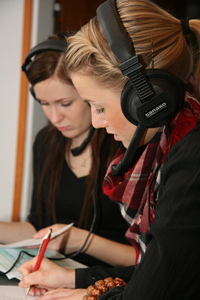Graduates: Internationality Singles Out Turku School of Economics
According to a survey conducted on 2010 by SEFE, graduates of Turku School of Economics are highly capable of learning and teamwork. Nearly 40 per cent have completed part of their studies abroad.
Graduates of Turku School of Economics are satisfied with the skills provided to them by their education, particularly their ability to learn new things and work as a team: graduates of 2010 assessed their ability as being above the national average. Additionally, problem-solving, interaction, presentation and communication abilities were also highly rated. The graduates evaluated their education in a survey conducted by SEFE, the Finnish Association of Business School Graduates.
According to the most recent report, the graduates also highly rate their foreign language teaching. In addition to language skills, TSE graduates feel well prepared to work in international environments slightly more often than Masters of Science in Economics and Business graduating from other educational units in the field of Economics.
To every statement concerning internationality, graduates majoring in International Business gave significantly higher average ratings than graduates within the field in general and those from other educational units.
Almost 40 per cent of survey respondents completed part of their studies through study exchange or traineeships abroad. Their number surpasses the national average value by almost 10 percentage units.
Atmosphere praised, but tutoring draws criticism
In addition to teaching and abilities, the respondents evaluated the educational unit. In Turku, the highest ratings were accorded to the learning atmosphere. Premises, equipment and IT support were also rated above average.
 As regards study guidance, the highest score was awarded to TSE's study guide, whose value corresponded to the national average. Recent graduates perceived teacher tutoring as the weakest link in study guidance. They also found room for improvement in cooperation with business life.
As regards study guidance, the highest score was awarded to TSE's study guide, whose value corresponded to the national average. Recent graduates perceived teacher tutoring as the weakest link in study guidance. They also found room for improvement in cooperation with business life.
– Through collaboration with SEFE, we have been collecting graduate feedback for over ten years. It is a valuable input that affects the way we develop our teaching. Comparison with other educational unit helps us interpret the figures, says Hannu Salmela, Professor and Vice-Director responsible for teaching. He adds that collected feedback is significant not only to quality system development, but also to external examinations and accreditation.
Graduates who completed a Master's degree at Turku School of Economics in 2010 had slightly shorter study times and found employment faster than the national average.
The Finnish Association of Business School Graduates SEFE and educational units in the field of Economics annually conduct a feedback survey of recent graduates holding Bachelor's or Master's degrees. This survey maps their opinions of the education and the educational unit. It also collects information on the position of recent graduates in the labour market. The most recent survey report was published in late 2011.
Speeding up careers
SEFE also prepared a report on the employment and early careers of TSE graduates who have spent five years in working life.
The respondents, who had graduated from TSE five years prior to the survey, had been employed for an average of 5 years and 2 months after graduating. They had spent 4 years and 10 months of this period in a position which corresponds to their level of education. These figures are the highest among the entire data.
Those who graduated from TSE in 2005 felt that their education corresponded rather well to their work. The report also reveals that the number of TSE graduates doing academic work in their field is slightly higher than the corresponding average number for other educational institutes.
TSE graduates also felt that their education enables them to advance in their careers more often than other respondents. The number of graduates in more demanding work was among the highest in the comparison between universities.